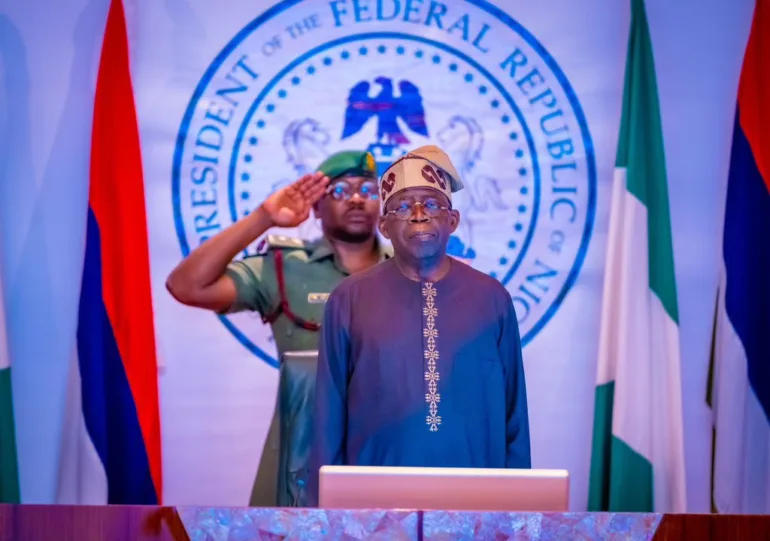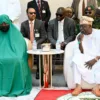President Bola Tinubu has issued a firm directive to the military to decisively confront Boko Haram terrorists, armed bandits, separatist agitators, and other criminal groups undermining Nigeria’s peace and sovereignty. He declared that “the time to crush these criminals is now.”
The president gave the charge on Saturday at the grand finale of the 2025 Nigerian Army Day Celebration held in Kaduna State. He was represented at the event by Vice President Kashim Shettima.
Reaffirming his administration’s unwavering commitment to the welfare of military personnel, Tinubu pledged continued investment in modern equipment, intelligence, and capacity development to strengthen the operational efficiency of the armed forces.
Vice President Shettima urged troops to carry out their duties with professionalism, courage, and discipline—guided by the Constitution and international best practices.
“The Nigerian Army has never been just a force of arms. It has been a symbol of unity and duty,” Shettima said. “It brought the Nigerian Civil War to an end. With those immortal words of General Yakubu Gowon—‘no victor, no vanquished’—we were reminded that we are one people with one destiny.”
He praised Nigerian troops for their commitment to peacekeeping missions across Africa and beyond, noting that they fight not for conquest, but for principle.
“We honour those who paid the supreme price and those still standing at the gates of our democracy, defending it from those who seek to destroy it,” he said.
Referencing the event’s theme, “The Nigerian Civil War: Peace and the Evolution of the Soldier-Peers Concept,” Shettima said it reflected not just military strategy, but the humanity behind it.
“You cannot build a great army without building strong soldiers. Their welfare, morale, equipment, and sense of purpose are not afterthoughts—they are the foundation of national security,” he added.
Tinubu acknowledged the existential nature of the threats facing the country—including terrorism, insurgency, banditry, and separatism—and stressed that these threats do not discriminate by ethnicity or religion.
“They destroy churches and mosques alike. They abduct children without regard to what they worship. Our response must be united, firm, and uncompromising,” he said.
Insecurity crisis deepens
Armed bandits have long terrorized the Northwest, operating with impunity across vast, ungoverned areas. Unlike Boko Haram and ISWAP jihadists in the Northeast, their motives are largely economic—centered on mass kidnappings for ransom and violent extortion.
In the Middle Belt, violence has taken on increasingly ethnic and religious overtones. According to Amnesty International, Benue State has recorded the highest death toll—6,896 people killed, followed by Plateau State with 2,630 deaths in the past two years.
When President Tinubu took office in 2023, he promised to make national security a top priority. But human rights groups say conditions have deteriorated.
“Instead, things have only gotten worse, as the authorities continue to fail to protect the rights to life, physical integrity, and security of tens of thousands across the country,” said Isa Sanusi, Director of Amnesty International Nigeria.
Surge in attacks
Recent months have seen a spike in attacks by jihadists and other armed groups in the North, raising concerns about the effectiveness of current security measures.
“The recent escalation of violence by Boko Haram and other armed groups shows that the security strategies of President Tinubu’s administration are simply not working,” Sanusi stated.
Nonetheless, in his second-anniversary address, Tinubu maintained that Nigerian troops had achieved notable progress.
“With the successes achieved, farmers are back tilling the land. Highways once deemed unsafe are now safer for travellers,” he said.
Yet, the government still faces growing separatist agitation in the Southeast, particularly from groups calling for the establishment of an independent Biafra.


